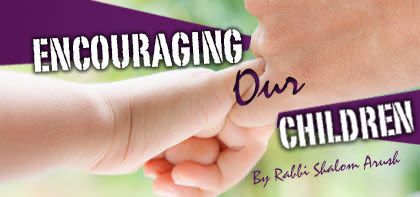
Encouraging Our Children
Children have feelings - they aren't uniform-looking dolls mass-produced in a Chinese factory. We should raise our children to enjoy being themselves...

Translated by Rabbi Lazer Brody
Once, my eldest brother told me that his daughter needed to pass her college-entrance exam in math. Over the course of four years, she hardly attended math classes, and there were only four months left until the exam. He was looking for someone to tutor her on four years’ worth of material in four months…
I said to him, “Fine. I’ll try to learn with her.”
I started to tutor her from the very beginning, starting with addition and subtraction, for one can’t learn without first knowing the basics. If I would have skipped this, assuming that she certainly knew the basics, I would have taken what seemed to be a short cut; however, the trip would have been a lot longer.
I continuously encouraged her: “I see that you are capable. Here, you succeeded!” She thought that she wasn’t  able to learn math at all, but with the encouragement she received, her self-esteem grew, opening up her mind. In a short while she knew the information and passed the exam.
able to learn math at all, but with the encouragement she received, her self-esteem grew, opening up her mind. In a short while she knew the information and passed the exam.
I wanted to get my youngest brother into a high school Yeshiva, but he lacked all the information that children learn during elementary school. The school administration said he’d have to learn everything virtually from scratch, so it was impossible for them to accept him. I asked them to allow me to learn for a little while with him; they agreed.
Within three months, we covered several years’ worth of material. How? With a lot of encouragement! The entire time I cheered him on: “You can do it! You are capable! See, you did it! Come, let’s thank Hashem!” Today, my brother is a Rosh Yeshiva. Through encouragement and love a person can succeed and excel.
In this manner, I succeeded with many others, such as groups of students who weren’t successful in learning Gemara. With patience and encouragement, I tutored them and they succeeded. Today they can learn Gemara because they had learned to believe in themselves. This gave them the desire to succeed in learning, and everything else they do.
Building a child as well as a student means giving — warmth, love, encouragement, and reinforcement. This helps raise a child’s self-confidence and self-belief.
In our generation, people persecute themselves. They focus on their own flaws all the time, conditioned to do so from their upbringing of constant criticism, belittling, and abuse. Insensitive and unthinking parents most likely labeled them “loser,” “lazy,” “dumb” and “coward”. One of my students, a former special-forces commando, almost lost his life several times trying to prove to himself that he wasn’t a coward. He sought to erase the stigma that a thoughtless parent pinned on him at an early age, when he refused to fight some boys that were bigger than him. Parents have no idea the depths of the wounds they inflict on their children with such cruel and heartless labels.
My parents of blessed memory bestowed me with a healthy measure of self-confidence and self-esteem, by virtue of the limitless love and attention they devoted to us. They gave us tools for life, something that even the greatest PhD in education could not have provided. This gift was given to us naturally, without any formal child-rearing training on their part. They knew from previous generations how to educate and how to teach us right from wrong.
Parents often harbor irrational expectations from their children. A parent must encourage a child to succeed with the talents and abilities that Hashem bestowed in that child. A parent should not expect a child to be what he is not, and certainly not belittle the child for something he either cannot do or finds difficulty in doing. The worse thing a parent can do is force a child with an aptitude for playing violin into going out for the football team, especially when he disdains roughness.
A common and tragic mistake that parents make is when they create a unified standard for all their children, ignoring the advice of King Solomon, to educate a child according to that child’s particular inclinations. Every child has strengths, tendencies and unique abilities. Every child is an exquisitely special world like no other. One must never evaluate or compare one child to another in any way for he needs to be guided in a manner that is appropriate for him alone. Saying to a child that he should be like his brother, sister, or anyone else for that matter, is considered an act of verbal abuse. We should raise our children to enjoy being themselves.










Tell us what you think!
Thank you for your comment!
It will be published after approval by the Editor.